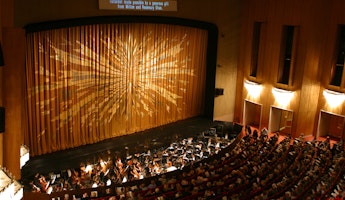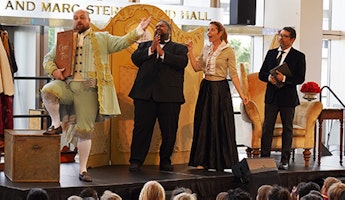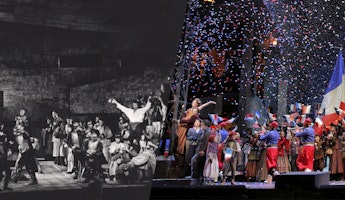Blog
April 21, 2022
A Familial Tale: In Conversation with Lisa See
On Gold Mountain, the best-selling novel-turned-opera, opens in the enchanting Chinese Gardens at The Huntington in just two weeks. The work tells the story of Fong See, a pioneer of Los Angeles’ Chinatown who immigrated to America to work and find his fortune. Lisa See, Fong's great-granddaughter, is the author and librettist of the acclaimed work.
We got the chance to sit down with her to discuss how she turned her family's story into art and what to expect from the highly-anticipated opening of the opera.

HOW LONG DID IT TAKE YOU TO WRITE ON GOLD MOUNTAIN?
It took me about five years to write On Gold Mountain. I interviewed friends, family and business associates. I went to where my great-grandmother was from. I went to where my grandmother was from. I went to different archives all up and down the West Coast. And then, of course, I went back to my home, and my great-grandfather's home village in China as well.
WHAT WAS THAT EXPERIENCE LIKE?
When I went to Fong’s home village, I stood on the rooftop pavilion of the house. My relatives who were with me would say, “Oh do you see that road over there? Fong See built it. That school over there? He built that too.” It was really moving to see the impact he left behind.
CAN YOU TALK A LITTLE BIT MORE ABOUT THE RESEARCH THAT WENT INTO THIS PROJECT? WHAT DID THAT CONSIST OF?
I interviewed about 100 relatives, but I also went to the National Archive where I found about 500 pages of interrogations, boarding passes, health certificates and photographs of my family. I was told it's the largest collection they have on any single family that came through Angel Island. And that's true—all the way to today.
Another big piece of it came from spending time with my grandparents specifically. Our family owned an antique store that had been started by my great-grandparents 130 or more years ago. I would visit my grandparents there when I was younger, and they would tell these incredible stories about my great-grandfather, Fong See, and how he came here alone as a boy of 14 and how he got his start.
So, I already knew quite a bit about him when I started this project, but I didn’t know everything he’d gone through. And I certainly didn’t know everything that happened with his wife, Ticie. A lot of the research that I did was going back to find her story: how they met, how they fell in love, how they decided to get married when it was against the law here in California for Chinese and white people to marry.
WHAT’S IT LIKE TO SEE YOUR FAMILY’S STORY PERFORMED IN FRONT OF YOU?
It was thrilling when we staged it for the first time 20 years ago and it’s just as thrilling now. I also couldn’t think of a more perfect place to tell this story than in the Chinese Gardens at The Huntington. All of these buildings and pavilions here are all built by Chinese artisans and craftsmen—it's an incredible place with traditional architecture that’s a perfect setting for this work.
WHEN PEOPLE WATCH THIS OPERA, WHAT DO YOU HOPE THAT THEY WALK AWAY WITH?
I hope what they come away with is this sense of Chinese American history the ups, the downs, the tragedies, the triumphs, but also an incredible love story being told in an extraordinarily beautiful place.








/03-cosi/_dsc0996_pr.jpg?format=auto&fit=crop&w=345&h=200&auto=format)













